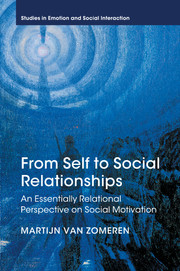Book contents
- From Self to Social Relationships
- Studies in Emotion and Social Interaction
- From Self to Social Relationships
- Copyright page
- Dedication
- Contents
- Figures
- Book part
- Prologue
- Part I Assumptions
- Part II Selvations theory
- Part III Implications
- Chapter 5 So what?
- Epilogue
- References
- Index
- Studies in Emotion and Social Interaction
Chapter 5 - So what?
from Part III - Implications
Published online by Cambridge University Press: 05 May 2016
- From Self to Social Relationships
- Studies in Emotion and Social Interaction
- From Self to Social Relationships
- Copyright page
- Dedication
- Contents
- Figures
- Book part
- Prologue
- Part I Assumptions
- Part II Selvations theory
- Part III Implications
- Chapter 5 So what?
- Epilogue
- References
- Index
- Studies in Emotion and Social Interaction
Summary
- Type
- Chapter
- Information
- From Self to Social RelationshipsAn Essentially Relational Perspective on Social Motivation, pp. 121 - 151Publisher: Cambridge University PressPrint publication year: 2016



